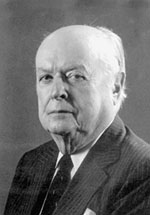Renowned archaeologist Willey dies at 89

Gordon Randolph Willey died of heart failure on the morning of April 28, in Cambridge. He was 89.
Widely recognized as the premier American archaeologist of the latter half of the 20th century, Willey became the first Charles P. Bowditch Professor of Central American and Mexican Archaeology and Ethnology at Harvard University in 1950. He taught in the Anthropology Department for 36 years.
Willey was renowned for his innovative and superbly documented research at numerous Maya archaeological sites in Belize (then British Honduras), Guatemala, and Honduras. Willey made both substantive and theoretical contributions to the archaeology of North and South America, and comparative studies with the Old World. He is recognized as the creator of the field of “settlement pattern studies” in archaeology, an enormously significant methodological advance that he pioneered in the Viru Valley on the northern coast of Peru in the late 1940s. In this new approach, the households and public works that people left behind provided a new window onto past societies. The ancient settlements and other features were shown to reflect people’s uses of the landscape and relations with their neighbors, thus enabling scholars to reconstruct the economic, political, and social organization of past cultures.
Prior to the Viru Valley work, Willey made important contributions to the archaeology of the Southeastern United States through his creative new methods of pottery analysis and reconstruction of ancient culture history. It was during his years in the Southeast that he met Katharine W. Whaley, whom he married in 1938, and with whom he had a devoted union for 63 years.
Born in Chariton, Iowa, on March 7, 1913, Willey received his bachelor’s degree from the University of Arizona and earned his Ph.D. from Columbia University in 1942. He went on to work at the Smithsonian Institution until assuming the Bowditch Professorship at Harvard in 1950. Willey’s 1949 book, “Archaeology of the Florida Gulf Coast,” became an instant classic, and is still carried in the back pocket of virtually all field archaeologists working in that part of the United States.
Willey’s masterful syntheses of New World culture history (“An Introduction to American Archaeology: Volume I, North and Middle America; Volume II, South America”), and “The History of American Archaeology” (co-authored with his former student, Jeremy Sabloff, and now in its third edition) cemented his status as “the doyen of North, Central, and South American archaeology.” He was widely admired for his prolific scholarship, but also for his never-ending optimism about the future of his chosen profession. His contributions to the field and his personal example are memorialized by the many awards and symposia that have been institutionalized in his honor in the American Anthropological Association, the Society for American Archaeology, and the Peabody Museum of Harvard University.
Willey produced dozens of Ph.D.s during his career at Harvard, two full generations of some of the leading archaeologists in this country. He served as President of the American Anthropological Association (1960-1962) and the Society for American Archaeology (1967-78). His numerous honors include the Kidder Award for Eminence in the Field of American Archaeology from the American Anthropological Association, the Viking Medal from the Viking Fund, the Huxley Medal from the Royal Anthropological Institute (U.K.), the Order of the Quetzal from the Government of Guatemala, and honorary doctorates from the University of Arizona and the University of Cambridge (U.K.), where he and Katharine enjoyed visiting and working on numerous occasions. He was a highly esteemed member of the American Academy of Arts and Sciences and the National Academy of Sciences.
In Boston, Willey was a revered regular at the Tavern Club, for which he wrote many award-winning plays. A great lover of limericks, Willey wrote many a fine one himself for his colleagues and students, who continue to count them among their most prized possessions. But he lavished most of his writing time on crafting archaeological mystery novels. Willey’s skills as a writer and his human qualities shine in each of these works, the first of which (“Selena”) was published and continues to be widely read.
Willey is survived by his two daughters, Alexandra Guralnick and Winston Adler; his two sons-in-law, Peter Guralnick and Jeffrey Adler; and his grandchildren Jacob and Nina Guralnick, and Nicholas, David, and Anthony Adler. A Memorial Service will be held on Wednesday, May 8, at the Christ Church in Cambridge, at 10 a.m.




